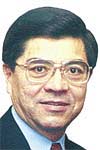Expert speakers examine Mexican security, elections

Dr. Julio León
Sept. 20 was a chance for Missouri Southern students to experience Mexico in a new way.
The guest speakers were Armand Peschard-Sverdup, director of the Mexico Project at the Center for Strategic and International Studies in Washington, D.C. and Loretta Bondi, an independent researcher and advocate focusing on international security, international organizations and coalitions, human rights, United Nations and regional sanctions and the arms trade.
The topics discussed were of Mexico’s part in the U.N. Security Council’s debate over the situation in Iraq, of Mexico’s security and foreign policy, an analysis of Mexico’s part in security for in the Americas, Mexican politics and political parties and the upcoming Mexican presidential election of 2006.
“I am not a scholar of Mexico,” Bondi said. “The views that I express are those of a journalist.”
Bondi used Mexico as a case study of how a medium-sized power such as Mexico could effect and shape domestic and international policies through “multilateral cooperation.”
Situations she described included Mexico’s views of the situation in Iraq, and security measures that Mexico has taken to ensure its own national security and that of neighboring countries.
“It wasn’t so much that Mexico was worried about its own national security,” Bondi said. “It was more the government making sure that terrorists could not get into the United States through Mexico.”
Following Bondi’s presentation, Peschard-Sverdup explained the political situation in Mexico and offered many scenarios that could be played out in Mexico’s upcoming 2006 election.
Peschard-Sverdup described the scenario of Mexico’s breaking away from a 71-year single-party rule in the 2000 election, which caused many unprecedented political changes. He also described Mexico’s reaction to the outcome of the 2000 election and whether or not Vicente Fox, current Mexican president, has delivered on his promise of change in Mexico.
After Peschard-Sverdup, the floor was opened to a question and answer session, where the audience was given a chance to ask questions or infer their own opinions unto the guest speakers.
Questions from the audience ranged from Mexico’s reactions to Sept. 11 to the media’s role in Mexico’s upcoming election.
“This symposium was an opportunity to learn more about a country that is a very important element to the United States,” said Dr. Julio Leon, University President. “We had two experts of Mexico to help us [more completely] understand our neighbors to the South.”
Your donation will support the student journalists of Missouri Southern State University. Your contribution will allow us to purchase equipment and cover our annual website hosting costs.



























